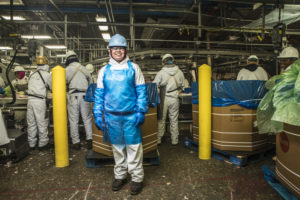 The Occupational Safety and Health Administration (OSHA) has issued two new enforcement policies to ensure employers are prioritizing the safety and health of their employees during the COVID-19 coronavirus outbreak. These new policies can help locals protect our members and maintain an accurate count of COVID-19 cases at workplaces.
The Occupational Safety and Health Administration (OSHA) has issued two new enforcement policies to ensure employers are prioritizing the safety and health of their employees during the COVID-19 coronavirus outbreak. These new policies can help locals protect our members and maintain an accurate count of COVID-19 cases at workplaces.
As businesses start to open across the country, OSHA has a new policy for inspecting workplaces and is increasing in-person inspections at all types of workplaces, including “non-critical” businesses. OSHA inspections will take place at workplaces in geographic areas where the spread of the virus has decreased significantly, as well as workplaces located in high risk areas. However, in the absence of an OSHA standard for COVID-19, it is unlikely OSHA will be able to cite companies for violations of any standard or regulation related to COVID-19 exposure.
OSHA also has a new policy for enforcing recordkeeping requirements for COVID-19 cases for all employers in all industries and is effective May 26, 2020. Employers in all UFCW represented industries are now required to record cases of COVID-19 that are deemed to be work-related, and meet the recordkeeping requirements contained in OSHA standard 29 CFR 1904. Previously, only the health care industry had to record these cases.
The UFCW believes all cases of COVID-19 in the workplace should be presumed work-related; however, OSHA is exercising enforcement discretion to assess employers’ efforts in making work-related determinations. With that in mind, here is some guidance for locals:
- COVID-19 illnesses are likely work-related when several cases develop among workers who work closely together and there is no alternative explanation.
- An employee’s COVID-19 illness is likely work-related if it is contracted shortly after lengthy, close exposure to a customer or coworker who has a confirmed case of COVID-19 and there is no alternative explanation.
- An employee’s COVID-19 illness is likely work-related if his or her job duties include having frequent, close exposure to the general public in a locality with ongoing community transmission and there is no alternative explanation.
- An employee’s COVID-19 illness is likely not work-related if he or she is the only worker to contract COVID-19 in his or her vicinity and his or her job duties do not include having frequent contact with the general public, regardless of the rate of community spread.
- An employee’s COVID-19 illness is likely not work-related if he or she, outside the workplace, closely and frequently associates with someone (e.g., a family member, significant other, or close friend) who (1) has COVID-19; (2) is not a coworker, and (3) exposes the employee during the period in which the individual is likely infectious.
 With this new guidance, locals are encouraged to:
With this new guidance, locals are encouraged to:
- Begin requesting copies of OSHA 300 logs. The UFCW’s Occupational Safety and Health Office can provide you with a copy of the template letter used to request OSHA 300 logs (email rrobbins@ufcw.org).
- Question companies about their process and investigations regarding the work-relatedness of cases of COVID-19 that occur among employees and request information related to investigations into work-relatedness of COVID-19 cases.
Any questions relating to these new OSHA policies should be directed to Robyn Robbins, director of the Occupational Safety and Health Office, at rrobbins@ufcw.org.

